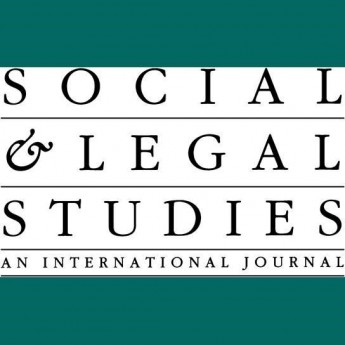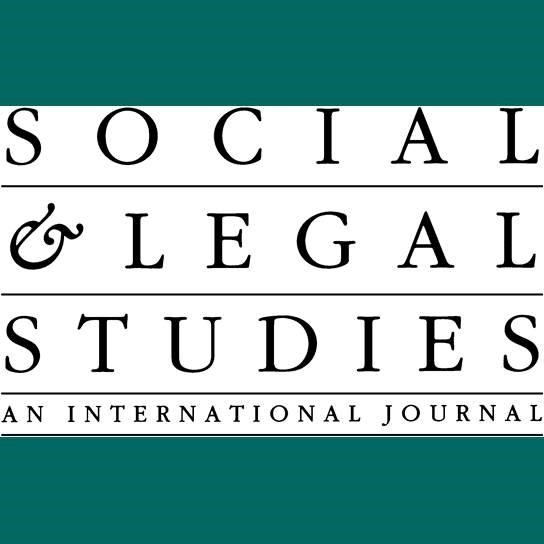Filip Strandberg Hassellind
Doctoral Candidate, University of Gothenburg in Sweden
Little over a year has passed since my article – “The International Criminal Trial as a Site for Contesting Historical and Political Narratives: The Case of Dominic Ongwen” – first was published in Social & Legal Studies. In this blog post, I would like to revisit some of the themes covered in the article in light of new developments. In this regard, this blog post could be read as an informal appendix to the article in the journal. Adding to this, I would also like to use this blog post as a way to point to some important topics that I believe could, or perhaps should, be addressed in future research endeavors.
Dominic Ongwen is a former child soldier and former commander of the Ugandan guerrilla group Lord’s Resistance Army (LRA). In 2014, he surrendered himself to US troops in the Central African Republic, and in 2021, the International Criminal Court (ICC) convicted him of war crimes and crimes against humanity, including murder, rape, torture, and enslavement.
In the article published in the journal, I honed in on how the international criminal trial emerges as a site for contesting historical and political narratives, and how the proceedings against Dominic Ongwen in the ICC gives us yet another opportunity to do so. I argued that the conflict in Uganda, as well as the Ongwen trial, cannot be understood in isolation from, on the one hand, interregional and factional struggles within the Ugandan territory and, on the other hand, a postcolonial logic.
Almost six months after the article was published, on 6 May 2021, Trial Chamber IX of the ICC sentenced Ongwen to 25 years of imprisonment. The judgment did not really come as a shock to those of us following the proceedings. Ongwen’s childhood and abduction by the LRA were taken into account as mitigating circumstances, but other than that, the judgment largely ignored the complex victim-perpetrator dynamic of Ongwen and the ways in which this has influenced the conduct at issue in focus at the trial. At the very least, the ICC shied away from elaborating in greater detail the difficulties of attaching criminal responsibility to actions carried out in extraordinary chaos.
Even though the case in the Trial Chamber stage now has reached an end, the case continues to draw worldwide attention. The question of Ongwen’s culpability in itself continues to be a highly divisive question among the people of northern Uganda (see Jiwa 2021). I believe it is difficult to move beyond the impression that the trial still is an extension of the conflict that lies at the heart of the proceedings, even if they are formally closed, barring an appeal from Ongwen (see Strandberg Hassellind 2021, p. 802).
When presiding judge Bertram Schmitt delivered a summary of the Chamber’s decision, he hailed that the trial was successful in bringing “to light all the evidence […] necessary for the establishment of the truth” (ICC 2021, para. 76). But truth is a construct of language, and language is created rather than established or found (cf. Rorty 1998, p. xvi). Moreover, Schmitt posits that the victims have a “legitimate desire to receive justice” and that “justice indeed demands that an adequate punishment be imposed on Dominic Ongwen” (ICC 2021, para. 56). In fact, the concepts of “truth” and “justice” are not clearly elaborated and little in the way of methodology is provided for how the Trial Chamber has gone about constructing their conceptions for truth and justice in this case.
Even though there undoubtedly was a heavy load of witnesses called, the victims of the conflict in Uganda far exceed those called as witnesses. The many conceptions of truth and justice among those who have survived the conflict is likely a highly complex matter. It is arguably not suitable to talk about the perceptions of the victims as a monolithic unit. It would require a lot of research to substantiate claims of knowing what the victims want and how they perceive Ongwen. The judges seem to believe that they have unearthed an objective idea of truth and justice attached to Ongwen, almost in an archeological sense, rather than having constructed it for themselves.
Could it be time for a break from using vague, indeterminate notions of “truth” and “justice” as strategies to legitimize normative excursions in international criminal law? This is the key reflection I would like to add with this blog post. Conceptions of “justice” and “truth” have clearly had an impact on the proceedings but are presented as neutral and uncontestable. In my view, it should be seen as an ethical obligation for jurists embedded in the global criminal law project to seek an understanding of “justice” and “truth” that is embedded in a grounded, bottom-up and multi-sited approach as opposed to a simplistic, legalistic top-down approach.
As lawyers dealing with questions concerning international criminality, we are constantly convoluted in the milieus of power and authority that shape the lived realities of the people of the Global South. It is important for those in power, especially those from a context with a colonial past, to portray events in a broader context, depicting and talking about how law may affect people in the international society differently, depending on local conditions. An extension of this logic is to perceive theory and method as integrated, which would in turn call for a methodological shift (Okafor 2008, p. 371).
Instead of using assumptions on the lives of people in the Global South as a bat for our own ideological and political positions, it could be appropriate to “build explicitly on the legal-ethnographic method” (Eslava and Pahuja 2011, p. 126). I suggest that there is a need to engage in this type of scholarship with a commitment to the politics of the Global South in good faith and with the acceptance of the challenge and dilemma of taking sides when producing knowledge that we deem to be relevant.
In the light of these final reflections, as I promised at the start, I also wanted to add some suggestions for further research that these new developments brought to the fore. Two research questions, in my mind, stands out, namely: i) Do the ideas of “truth” and “justice” disseminated by the Trial Chamber match up with the realities of those who have experienced the conflict in Uganda connected to Dominic Ongwen? and ii) How can the ICC incorporate more empirical material in their everyday operations and how does this sit with what many view as their primary responsibility, the determination of individual criminal responsibility? These are questions, among those I point to in my article (see p. 806) I would like to see elaborated further in the future.
Read more by this author
‘The International Criminal Trial as a Site for Contesting Historical and Political Narratives: The Case of Dominic Ongwen’ (2021) 30(5) Social & Legal Studies 790
“Groups Defined by Gender and the Genocide Convention” (2020) 14(1) Genocide Studies and Prevention: An International Journal 60
“Nordic Critical Legal Scholarship and Global North/South Encounters” (2021) 170 (3 & 4) Retfaerd 11
“(Re)sketching the theorizing around ‘missing women’: imageries of the future, resistance, and materializing aspects of gender” (2021) International Feminist Journal of Politics, epub ahead of print: https://www.tandfonline.com/doi/full/10.1080/14616742.2021.1981769
“Just another battleground: resisting courtroom historiography in the extraordinary chambers in the courts of Cambodia” (2020) 13(2) Journal of Political Power 252
About the author
Filip Strandberg Hassellind is a doctoral candidate in international law at the University of Gothenburg in Sweden. His primary research interest is international criminal law. His current research looks at the nexus between genocide, the concept of gendercide, and resistance. He is also interested in history-writing in international criminal law.
References
Eslava, L. and Pahuja, S. 2011. Between Resistance and Reform: TWAIL and the Universality of International Law. Trade, Law and Development, 3 (1): 103–30.
Jiwa, J. Trial of LRA commander Ongwen still divides northern Uganda. The New Humanitarian, 30 June 2021. Available at: https://www.thenewhumanitarian.org/news-feature/2021/6/30/trial-of-LRA-commander-ongwen-still-divides-northern-uganda (accessed 3 January 2022).
Okafor, O. 2008. Critical Third World Approaches to International Law: Theory, Methodology, or Both? International Community Law Review, 10 (1): 371–78.
Prosecutor v. Dominic Ongwen. 2021. Summary of the delivery of the sentence on 6 May 2021. Available at: https://www.icc-cpi.int/itemsDocuments/210506-ongwen-sentence-summary-eng.pdf (accessed 5 January 2022).
Rorty, R., 1989. Contingency, Irony and Solidarity. New York: Cambridge University Press.
Strandberg Hassellind, F. 2021. The International Criminal Trial as a Site for Contesting Historical and Political Narratives: The Case of Dominic Ongwen. Social & Legal Studies, 30 (5): 790–809.

